| Listing 1 - 10 of 26 | << page >> |
Sort by
|
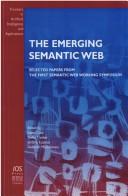
ISBN: 1601294646 600000575X 9786610505500 1280505508 0585458898 9780585458892 1586032550 9781586032555 4274905136 9784274905131 9781601294647 6610505500 9781280505508 Year: 2002 Publisher: Amsterdam ; Washington, DC : Tokyo : IOS Press ; Ohmsha,
Abstract | Keywords | Export | Availability | Bookmark
 Loading...
Loading...Choose an application
- Reference Manager
- EndNote
- RefWorks (Direct export to RefWorks)
The Semantic Web is a Web defined and linked in a way that it can be used by machines not just for display purposes, but also for automation, integration and reuse of data across various applications. In order for computers to provide more help to people, the Semantic Web augments the current Web with formalized knowledge and data that can be processed by computers. It thus needs a language for expressing knowledge. This knowledge is used to describe the content of information sources, through ontologies, and the condition of operation of Web services. This work presents the state-of-the-art i
Book
ISBN: 1280505788 9786610505784 6000005342 1601294565 0585458987 9780585458984 9781601294562 1586033069 9781586033064 427490556X 9784274905568 Year: 2002 Publisher: Amsterdam ; Washington, DC : IOS Press,
Abstract | Keywords | Export | Availability | Bookmark
 Loading...
Loading...Choose an application
- Reference Manager
- EndNote
- RefWorks (Direct export to RefWorks)
This work covers commercial applications that make immediate advances and gains insight into the evolution of Semantic Web technology. It focuses on real applications attacking real world problems. This potentially means pragmatic decisions caused by the limitations of today's technology.
World Wide Web. --- Semantic Web. --- Semantic integration (Computer systems) --- Semantic networks (Information theory) --- World Wide Web --- Microformats --- W3 (World Wide Web) --- Web (World Wide Web) --- World Wide Web (Information retrieval system) --- WWW (World Wide Web) --- Hypertext systems --- Multimedia systems --- Internet
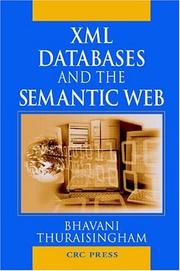
ISBN: 0849310318 Year: 2002 Publisher: Boca Raton CRC
Abstract | Keywords | Export | Availability | Bookmark
 Loading...
Loading...Choose an application
- Reference Manager
- EndNote
- RefWorks (Direct export to RefWorks)
Database management --- Semantic Web --- Web site development --- XML (Document markup language) --- 681.3*H --- 681.3*H Information systems --- Information systems --- Extendible Markup Language (Document markup language) --- eXtensible Markup Language (Document markup language) --- Document markup languages --- Development of Web sites --- Web sites --- Internet programming --- Semantic integration (Computer systems) --- Semantic networks (Information theory) --- World Wide Web --- Microformats --- Data base management --- Data services (Database management) --- Database management services --- DBMS (Computer science) --- Generalized data management systems --- Services, Database management --- Systems, Database management --- Systems, Generalized database management --- Electronic data processing --- Development --- XML (extensible markup language)
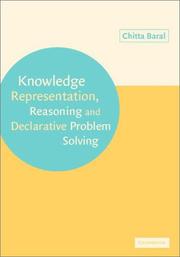
ISBN: 0521818028 Year: 2002 Publisher: Cambridge Cambridge University press
Abstract | Keywords | Export | Availability | Bookmark
 Loading...
Loading...Choose an application
- Reference Manager
- EndNote
- RefWorks (Direct export to RefWorks)
Knowledge management and knowledge-based intelligence are areas of importance in today's economy and society, and to exploit them fully and efficiently it is necessary both to represent and reason about knowledge via a declarative interface whose input language is based on logic. In this book, Chitta Baral shows exactly how to go about doing that: how to write programs that behave intelligently by giving them the ability to express knowledge and reason about it. He presents a language, AnsProlog, for both knowledge representation and reasoning, and declarative problem solving. Many of the results here have never appeared before in book form, and they have been organised here into a form that will appeal to practicing and would-be knowledge engineers wishing to learn more about the subject, either in courses or through self-teaching. A comprehensive bibliography rounds off the book.
Artificial intelligence. --- Expert systems (Computer science). --- Knowledge representation (Information theory). --- Artificial intelligence --- Expert systems (Computer science) --- Knowledge representation (Information theory) --- 681.3*I24 --- 681.3*I24 Knowledge representation formalisms and methods: frames and scripts; predicate logic; relation systems; representation languages; procedural and rule-based representations; semantic networks (Artificial intelligence) --- Knowledge representation formalisms and methods: frames and scripts; predicate logic; relation systems; representation languages; procedural and rule-based representations; semantic networks (Artificial intelligence) --- Representation of knowledge (Information theory) --- Information theory --- Knowledge-based systems (Computer science) --- Systems, Expert (Computer science) --- Computer systems --- Soft computing --- AI (Artificial intelligence) --- Artificial thinking --- Electronic brains --- Intellectronics --- Intelligence, Artificial --- Intelligent machines --- Machine intelligence --- Thinking, Artificial --- Bionics --- Cognitive science --- Digital computer simulation --- Electronic data processing --- Logic machines --- Machine theory --- Self-organizing systems --- Simulation methods --- Fifth generation computers --- Neural computers
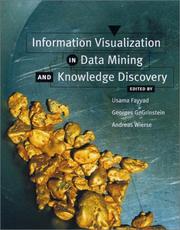
ISBN: 1558606890 0585456585 9780585456584 9781558606890 Year: 2002 Publisher: San Francisco Morgan Kaufmann
Abstract | Keywords | Export | Availability | Bookmark
 Loading...
Loading...Choose an application
- Reference Manager
- EndNote
- RefWorks (Direct export to RefWorks)
Information systems --- Information visualization --- Data mining --- Knowledge acquisition (Expert systems) --- 681.3*D28 --- 681.3*I24 --- 681.3*I26 --- Management Information System --- dataverwerking --- operations research --- wiskundige statistiek --- Acquisition, Knowledge (Expert systems) --- Expertise acquisition (Expert systems) --- Expert systems (Computer science) --- Data visualization --- Visualization of information --- Information science --- Visual analytics --- Algorithmic knowledge discovery --- Factual data analysis --- KDD (Information retrieval) --- Knowledge discovery in data --- Knowledge discovery in databases --- Mining, Data --- Database searching --- Metrics: complexity measures; performance measures; software science (Software engineering)--See also {681.3*D48} --- Knowledge representation formalisms and methods: frames and scripts; predicate logic; relation systems; representation languages; procedural and rule-based representations; semantic networks (Artificial intelligence) --- Learning: analogies; concept learning; induction; knowledge acquisition; language acquisition; parameter learning (Artificial intelligence)--See also {681.3*K32} --- 681.3*I26 Learning: analogies; concept learning; induction; knowledge acquisition; language acquisition; parameter learning (Artificial intelligence)--See also {681.3*K32} --- 681.3*I24 Knowledge representation formalisms and methods: frames and scripts; predicate logic; relation systems; representation languages; procedural and rule-based representations; semantic networks (Artificial intelligence) --- 681.3*D28 Metrics: complexity measures; performance measures; software science (Software engineering)--See also {681.3*D48}
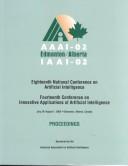
ISBN: 0262511290 Year: 2002 Publisher: [Place of publication not identified] MIT Press
Abstract | Keywords | Export | Availability | Bookmark
 Loading...
Loading...Choose an application
- Reference Manager
- EndNote
- RefWorks (Direct export to RefWorks)
681.3*I23 <063> --- 681.3*I24 <063> --- 681.3*I26 <063> --- 681.3*I27 <063> --- 681.3*D16 <063> --- 681.3*I2m --- Deduction and theorem proving: answer/reason extraction; reasoning; resolution; metatheory; mathematical induction; logic programming (Artificial intelligence)--Congressen --- Knowledge representation formalisms and methods: frames and scripts; predicate logic; relation systems; representation languages; procedural and rule-based representations; semantic networks (Artificial intelligence)--Congressen --- Learning: analogies; concept learning; induction; knowledge acquisition; language acquisition; parameter learning (Artificial intelligence)--See also {681.3*K32}--Congressen --- Natural language processing: language generation; language models; language parsing and understanding; machine translation; speech recognition and under-standing; text analysis (Artificial intelligence)--Congressen --- Programming techniques: Logic programming--Congressen --- Artificial intelligence. AI --- Information Technology --- Computer Science (Hardware & Networks) --- 681.3*I2m Artificial intelligence. AI --- 681.3*I26 <063> Learning: analogies; concept learning; induction; knowledge acquisition; language acquisition; parameter learning (Artificial intelligence)--See also {681.3*K32}--Congressen --- 681.3*I24 <063> Knowledge representation formalisms and methods: frames and scripts; predicate logic; relation systems; representation languages; procedural and rule-based representations; semantic networks (Artificial intelligence)--Congressen --- 681.3*I23 <063> Deduction and theorem proving: answer/reason extraction; reasoning; resolution; metatheory; mathematical induction; logic programming (Artificial intelligence)--Congressen
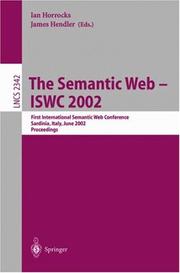
ISSN: 03029743 ISBN: 3540437606 9783540437604 3540480056 Year: 2002 Volume: 2342 Publisher: New York, NY ; Berlin : Springer-Verlag,
Abstract | Keywords | Export | Availability | Bookmark
 Loading...
Loading...Choose an application
- Reference Manager
- EndNote
- RefWorks (Direct export to RefWorks)
Semantic Web --- Web site development --- Knowledge management --- Ontology --- Web sémantique --- Sites Web --- Gestion des connaissances --- Ontologie --- Congresses --- Congrès --- Développement --- Computer science. --- Computer communication systems. --- Database management. --- Information storage and retrieval. --- Artificial intelligence. --- Computer Science. --- Information Systems Applications (incl. Internet). --- Popular Computer Science. --- Database Management. --- Computer Communication Networks. --- Artificial Intelligence (incl. Robotics). --- Information Storage and Retrieval. --- Information storage and retrieva. --- Artificial Intelligence. --- AI (Artificial intelligence) --- Artificial thinking --- Electronic brains --- Intellectronics --- Intelligence, Artificial --- Intelligent machines --- Machine intelligence --- Thinking, Artificial --- Bionics --- Cognitive science --- Digital computer simulation --- Electronic data processing --- Logic machines --- Machine theory --- Self-organizing systems --- Simulation methods --- Fifth generation computers --- Neural computers --- Data base management --- Data services (Database management) --- Database management services --- DBMS (Computer science) --- Generalized data management systems --- Services, Database management --- Systems, Database management --- Systems, Generalized database management --- Information storage and retrieval systems. --- Automatic data storage --- Automatic information retrieval --- Automation in documentation --- Computer-based information systems --- Data processing systems --- Data storage and retrieval systems --- Discovery systems, Information --- Information discovery systems --- Information processing systems --- Information retrieval systems --- Machine data storage and retrieval --- Mechanized information storage and retrieval systems --- Computer systems --- Electronic information resources --- Data libraries --- Digital libraries --- Information organization --- Information retrieval --- Application software. --- Communication systems, Computer --- Computer communication systems --- Data networks, Computer --- ECNs (Electronic communication networks) --- Electronic communication networks --- Networks, Computer --- Teleprocessing networks --- Data transmission systems --- Digital communications --- Electronic systems --- Information networks --- Telecommunication --- Cyberinfrastructure --- Network computers --- Informatics --- Science --- Application computer programs --- Application computer software --- Applications software --- Apps (Computer software) --- Computer software --- Distributed processing --- Semantic Web - Congresses --- Web site development - Congresses --- Knowledge management - Congresses --- Ontology - Congresses
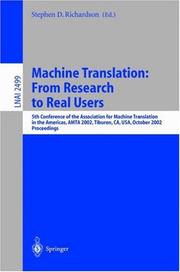
ISBN: 3540442820 3540458204 Year: 2002 Publisher: Berlin, Heidelberg : Springer Berlin Heidelberg : Imprint: Springer,
Abstract | Keywords | Export | Availability | Bookmark
 Loading...
Loading...Choose an application
- Reference Manager
- EndNote
- RefWorks (Direct export to RefWorks)
AMTA 2002: From Research to Real Users Ever since the showdown between Empiricists and Rationalists a decade ago at TMI 92, MT researchers have hotly pursued promising paradigms for MT, including da- driven approaches (e.g., statistical, example-based) and hybrids that integrate these with more traditional rule-based components. During the same period, commercial MT systems with standard transfer archit- tures have evolved along a parallel and almost unrelated track, increasing their cov- age (primarily through manual update of their lexicons, we assume) and achieving much broader acceptance and usage, principally through the medium of the Internet. Webpage translators have become commonplace; a number of online translation s- vices have appeared, including in their offerings both raw and postedited MT; and large corporations have been turning increasingly to MT to address the exigencies of global communication. Still, the output of the transfer-based systems employed in this expansion represents but a small drop in the ever-growing translation marketplace bucket.
Machine translating --- Philology & Linguistics --- Languages & Literatures --- Computer science. --- Mathematical logic. --- Artificial intelligence. --- Computational linguistics. --- Translation and interpretation. --- Computer Science. --- Language Translation and Linguistics. --- Translation. --- Artificial Intelligence (incl. Robotics). --- Mathematical Logic and Formal Languages. --- Natural language processing (Computer science). --- Translating and interpreting. --- Natural Language Processing (NLP). --- Artificial Intelligence. --- AI (Artificial intelligence) --- Artificial thinking --- Electronic brains --- Intellectronics --- Intelligence, Artificial --- Intelligent machines --- Machine intelligence --- Thinking, Artificial --- Bionics --- Cognitive science --- Digital computer simulation --- Electronic data processing --- Logic machines --- Machine theory --- Self-organizing systems --- Simulation methods --- Fifth generation computers --- Neural computers --- Informatics --- Science --- Interpretation and translation --- Interpreting and translating --- Language and languages --- Literature --- Translation and interpretation --- Translators --- NLP (Computer science) --- Artificial intelligence --- Human-computer interaction --- Semantic computing --- Translating --- Algebra of logic --- Logic, Universal --- Mathematical logic --- Symbolic and mathematical logic --- Symbolic logic --- Mathematics --- Algebra, Abstract --- Metamathematics --- Set theory --- Syllogism
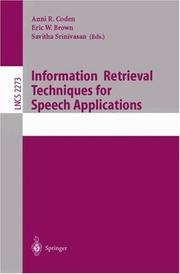
ISBN: 354043156X 3540456376 Year: 2002 Publisher: New York, NY ; Berlin : Springer-Verlag,
Abstract | Keywords | Export | Availability | Bookmark
 Loading...
Loading...Choose an application
- Reference Manager
- EndNote
- RefWorks (Direct export to RefWorks)
This volume is based on a workshop held on September 13, 2001 in New Orleans, LA, USA as part of the24thAnnualInternationalACMSIGIRConferenceon ResearchandDevelopmentinInformationRetrieval.Thetitleoftheworkshop was: “Information Retrieval Techniques for Speech Applications.” Interestinspeechapplicationsdatesbackanumberofdecades.However, it is only in the last few years that automatic speech recognition has left the con?nes of the basic research lab and become a viable commercial application. Speech recognition technology has now matured to the point where speech can be used to interact with automated phone systems, control computer programs, andevencreatememosanddocuments.Movingbeyondcomputercontroland dictation, speech recognition has the potential to dramatically change the way we create,capture,andstoreknowledge.Advancesinspeechrecognitiontechnology combined with ever decreasing storage costs and processors that double in power every eighteen months have set the stage for a whole new era of applications that treat speech in the same way that we currently treat text. The goal of this workshop was to explore the technical issues involved in a- lying information retrieval and text analysis technologies in the new application domainsenabledbyautomaticspeechrecognition.Thesepossibilitiesbringwith themanumberofissues,questions,andproblems.Speech-baseduserinterfaces create di?erent expectations for the end user, which in turn places di?erent - mands on the back-end systems that must interact with the user and interpret theuser’scommands.Speechrecognitionwillneverbeperfect,soanalyses- plied to the resulting transcripts must be robust in the face of recognition errors. The ability to capture speech and apply speech recognition on smaller, more - werful, pervasive devices suggests that text analysis and mining technologies can be applied in new domains never before considered.
Speech processing systems --- Information storage and retrieval systems --- Electrical Engineering --- Electrical & Computer Engineering --- Engineering & Applied Sciences --- Computer science. --- Information storage and retrieval. --- Computational linguistics. --- Computer Science. --- Information Storage and Retrieval. --- Language Translation and Linguistics. --- Information storage and retrieva. --- Natural language processing (Computer science). --- Natural Language Processing (NLP). --- NLP (Computer science) --- Artificial intelligence --- Electronic data processing --- Human-computer interaction --- Semantic computing --- Information storage and retrieval systems. --- Automatic data storage --- Automatic information retrieval --- Automation in documentation --- Computer-based information systems --- Data processing systems --- Data storage and retrieval systems --- Discovery systems, Information --- Information discovery systems --- Information processing systems --- Information retrieval systems --- Machine data storage and retrieval --- Mechanized information storage and retrieval systems --- Computer systems --- Electronic information resources --- Data libraries --- Digital libraries --- Information organization --- Information retrieval
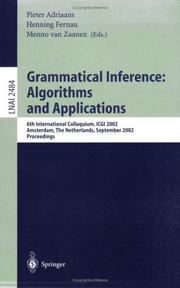
ISBN: 3540457909 3540442391 Year: 2002 Publisher: Berlin, Heidelberg : Springer Berlin Heidelberg : Imprint: Springer,
Abstract | Keywords | Export | Availability | Bookmark
 Loading...
Loading...Choose an application
- Reference Manager
- EndNote
- RefWorks (Direct export to RefWorks)
The Sixth International Colloquium on Grammatical Inference (ICGI2002) was held in Amsterdam on September 23-25th, 2002. ICGI2002 was the sixth in a series of successful biennial international conferenceson the area of grammatical inference. Previous meetings were held in Essex, U.K.; Alicante, Spain; Mo- pellier, France; Ames, Iowa, USA; Lisbon, Portugal. This series of meetings seeks to provide a forum for the presentation and discussion of original research on all aspects of grammatical inference. Gr- matical inference, the process of inferring grammars from given data, is a ?eld that not only is challenging from a purely scienti?c standpoint but also ?nds many applications in real-world problems. Despite the fact that grammatical inference addresses problems in a re- tively narrow area, it uses techniques from many domains, and is positioned at the intersection of a number of di?erent disciplines. Researchers in grammatical inference come from ?elds as diverse as machine learning, theoretical computer science, computational linguistics, pattern recognition, and arti?cial neural n- works. From a practical standpoint, applications in areas like natural language - quisition, computational biology, structural pattern recognition, information - trieval, text processing, data compression and adaptive intelligent agents have either been demonstrated or proposed in the literature. The technical program included the presentation of 23 accepted papers (out of 41 submitted). Moreover, for the ?rst time a software presentation was or- nized at ICGI. Short descriptions of the corresponding software are included in these proceedings, too.
Formal languages --- Logic, Symbolic and mathematical --- Algebra --- Mathematics --- Physical Sciences & Mathematics --- Computer science. --- Programming languages (Electronic computers). --- Computer logic. --- Mathematical logic. --- Artificial intelligence. --- Computational linguistics. --- Computer Science. --- Language Translation and Linguistics. --- Programming Languages, Compilers, Interpreters. --- Artificial Intelligence (incl. Robotics). --- Mathematical Logic and Formal Languages. --- Logics and Meanings of Programs. --- Natural language processing (Computer science). --- Logic design. --- Natural Language Processing (NLP). --- Artificial Intelligence. --- Informatics --- Science --- NLP (Computer science) --- Artificial intelligence --- Electronic data processing --- Human-computer interaction --- Semantic computing --- Design, Logic --- Design of logic systems --- Digital electronics --- Electronic circuit design --- Logic circuits --- Machine theory --- Switching theory --- AI (Artificial intelligence) --- Artificial thinking --- Electronic brains --- Intellectronics --- Intelligence, Artificial --- Intelligent machines --- Machine intelligence --- Thinking, Artificial --- Bionics --- Cognitive science --- Digital computer simulation --- Logic machines --- Self-organizing systems --- Simulation methods --- Fifth generation computers --- Neural computers --- Computer science logic --- Algebra of logic --- Logic, Universal --- Mathematical logic --- Symbolic and mathematical logic --- Symbolic logic --- Algebra, Abstract --- Metamathematics --- Set theory --- Syllogism --- Computer languages --- Computer program languages --- Computer programming languages --- Machine language --- Languages, Artificial
| Listing 1 - 10 of 26 | << page >> |
Sort by
|

 Search
Search Feedback
Feedback About
About Help
Help News
News